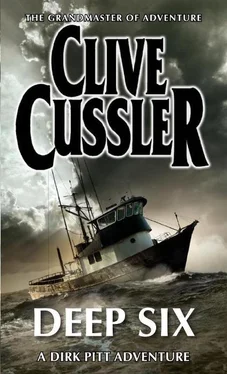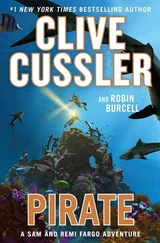“Perhaps it would be in the best interests of everyone present,” Oates said quietly, “to continue the search for Margolin.”
“I’m in total agreement,” said Brogan. “We can’t write him off until we find his body.”
“Questions will most certainly arise,” added Mercier. “For example, how did he die?”
“Obviously he drowned,” Moran answered. “Probably when the Eagle sank.”
“Also,” Mercier continued, “you never satisfactorily explained when and how you and Marcus Larimer disembarked from the Eagle and traveled to an as-yet-undisclosed resort for your Caribbean fishing trip.”
“I’ll be happy to answer any questions before a congressional investigating committee,” said Moran. “Certainly not here and now in front of people who are in opposition to me.”
“You must understand, in spite of his mistakes, our loyalties lie with the President,” said Oates.
“I don’t doubt it for a minute,” said Moran. “That’s why I summoned you here this morning. Ten minutes after the Senate votes, I will be sworn in as President. My first official act will be to announce either your resignations or firings; you have your choice. As of midnight tonight, none of you will be working for the United States government.”
The narrow paved road snaked through the high hills that dropped steeply into the Black Sea. In the rear seat of a Cadillac Seville stretch limousine, Vladimir Polevoi sat reading the latest report from Aleksei Lugovoy. Every once in a while he looked up and gazed at the dawn sun creeping past the horizon.
The limousine turned heads wherever it rolled. Custom built with inlaid wood cabinets, color TV, electric divider, liquor bar and overhead stereo console, it had been ordered purchased by Polevoi and transported to Moscow under the guise of studying its mechanical technology. Shortly after its arrival he’d commandeered it as his own.
The long car climbed around the forested edge of a craggy cliff until the road ended at a huge wooden door hinged to a high brick wall. A uniformed officer saluted the KGB chief and pressed a switch. The door silently swung open to a vast garden that blazed with flowers, and the car was driven in and parked beside a spreading one-story house, constructed in a Western contemporary design.
Polevoi walked up circular stone steps and entered a foyer, where he was greeted by President Antonov’s secretary and escorted to a table and chairs on a terrace overlooking the sea.
After a few moments Antonov appeared, followed by a pretty servant girl carrying a huge plate of smoked salmon, caviar and iced vodka. Antonov seemed in a happy mood and casually sat on the iron railing around the terrace.
“You have a beautiful new dacha,” said Polevoi.
“Thank you. I had it designed by a firm of French architects. They didn’t charge me a ruble. It won’t pass critical inspection by a state building committee, of course. Too bourgeois. But what the hell. Times are changing.” Then he switched the subject abruptly. “What news of events in Washington?”
“The President will be removed from office,” answered Polevoi.
“When?”
“By this time tomorrow.”
“No doubt of this.”
“None.”
Antonov picked up his vodka glass and emptied it, and the girl immediately refilled it. Polevoi suspected the girl did more than simply pour vodka for the head of the Soviet Union.
“Did we miscalculate, Vladimir?” Antonov asked. “Did we expect to accomplish too much too quickly?”
“Nobody can second-guess the Americans. They don’t behave in predictable ways.”
“Who will be the new President?”
“Alan Moran, Speaker of the House of Representatives.”
“Can we work with him?”
“My sources say he has a devious mind, but can be swayed.”
Antonov stared at a tiny fishing boat far below on the water. “If given the choice, I’d prefer Moran over Vice President Margolin.”
“Most definitely,” Polevoi agreed. “Margolin is a dedicated enemy of our Communist society, and an adamant believer in expanding the American military machine beyond our own.”
“Anything our people can do, discreetly, of course, to assist Moran into the White House?”
Polevoi shook his head. “Very little worth the risk of exposure and adverse propaganda.”
“Where is Margolin?”
“Still in the hands of the Bougainvilles.”
“Any chance that that old Oriental bitch will release him in time to cut out Moran?”
Polevoi shrugged helplessly. “Who can predict her schemes with any accuracy?”
“If you were her, Vladimir, what would you do?”
Polevoi paused thoughtfully, then said, “I’d strike a deal with Moran to dispose of Margolin.”
“Has Moran the guts to accept?”
“If one man who was being held prisoner in an extremely vulnerable situation stood between you and leadership of a superpower, how would you play it?”
Antonov broke into a loud laugh that frightened a nearby bird into flight. “You read through me like glass, old friend. I see your point. I wouldn’t hesitate to remove him.”
“The American news media report that Moran is claiming Margolin committed suicide by drowning.”
“So your theory is on firm ground,” said Antonov. “Maybe the old Steel Lotus will end up doing us a favor after all.”
“At least our deal with her didn’t cost anything.”
“Speaking of cost, what is the status of the gold?”
“Admiral Borchavski has begun salvage operations. He expects to raise every bar within three weeks.”
“That’s good news,” said Antonov. “And what of Dr. Lugovoy? Can he continue his project after the President is cast from office?”
“He can,” Polevoi replied. “Locked inside the President’s head is a vast treasure store of United States secrets. Lugovoy has yet to tap it.”
“Then keep the project going. Provide Lugovoy with an extensive list of delicate political and military subjects we wish explored. All American leaders who leave office are consulted for their experience, regardless of inept handling of their administrations. The capitalist masses have short memories. The knowledge the President now possesses and has yet to learn from briefings by his successors can be of great benefit to us in the future. This time we shall practice patience and probe slowly. The President’s brain may turn out to be a goose that lays golden intelligence eggs for decades to come.”
Polevoi raised his glass. “A toast to the best secret agent we ever recruited.”
Antonov smiled. “Long may he produce.”
Across half a world, Raymond Edgely sat at a console and read the data that unrolled from a paper recorder. He raised his glasses and rubbed his reddened eyes. Despite his seeming tiredness, there was a tightly contained nervous energy about him. His competitive juices were stirred. The opportunity to beat his most esteemed counterpart in a game of psychological intrigue drove him beyond any thought of sleep.
Dr. Harry Greenberg, a respected psychiatric researcher in his own right, lit a curved-stem clay pipe. After stoking the stained yellow bowl to life, he pointed the mouthpiece at the recorder.
“No sense in waiting any longer, Ray. I’m satisfied we have the necessary data to make the switch.”
“I hate to rush in before I’m certain we can fool Aleksei.”
“Do it,” Greenberg urged. “Stop screwing around and go for it.”
Edgely looked around at his ten-member team of psychologists. They stared back at him expectantly. Then he nodded. “Okay, everybody stand by to transfer thought communication from the President’s implant to our central computer.”
Greenberg walked around the room, briefly talking to everyone, double-checking the procedures. Three sat at the computer console, their hands poised over the buttons. The rest studied the display screens and monitored the data.
Читать дальше












